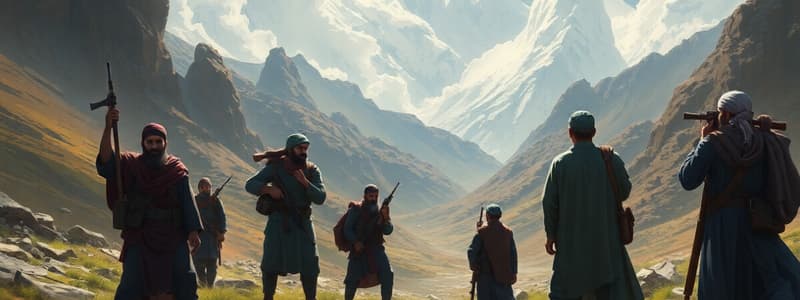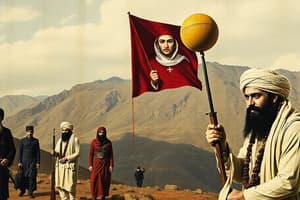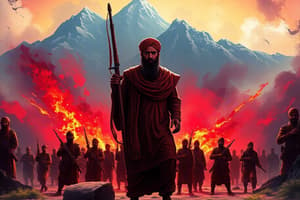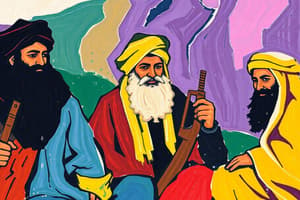Podcast
Questions and Answers
What was the primary method used by the Radio Mullah to disseminate his messages and exert influence over the local population?
What was the primary method used by the Radio Mullah to disseminate his messages and exert influence over the local population?
- Utilizing clandestine radio broadcasts to reach a wide audience. (correct)
- Distributing pamphlets and leaflets door-to-door.
- Establishing a network of messengers to spread his decrees.
- Holding public rallies and gatherings in town squares.
What specific claim did the Radio Mullah make regarding polio vaccinations, and how did this affect public health initiatives in the region?
What specific claim did the Radio Mullah make regarding polio vaccinations, and how did this affect public health initiatives in the region?
- He suggested alternative traditional medicines could provide better protection against polio.
- He remained silent on the issue, neither promoting nor condemning them.
- He praised them as life-saving and encouraged widespread adoption.
- He claimed they were a Western ploy to harm Muslim children, discouraging parents from vaccinating their children. (correct)
Beyond healthcare and education, what other actions did the Radio Mullah undertake to enforce his interpretation of Islamic law and societal norms?
Beyond healthcare and education, what other actions did the Radio Mullah undertake to enforce his interpretation of Islamic law and societal norms?
- Organizing community dialogues and debates on religious matters.
- Establishing vocational training centers for unemployed youth.
- Threatening barbers who offered Western haircuts and destroying music stores. (correct)
- Providing financial aid and support to underprivileged families.
How did Fazlullah finance his militant activities, and what impact did this have on the local community's sense of security?
How did Fazlullah finance his militant activities, and what impact did this have on the local community's sense of security?
What was the appearance of Fazlullah's followers, and how did their presence affect the perception of security and stability in the Swat Valley?
What was the appearance of Fazlullah's followers, and how did their presence affect the perception of security and stability in the Swat Valley?
What agreement was made between Fazlullah and the government in May 2007, and what were the supposed terms of this accord?
What agreement was made between Fazlullah and the government in May 2007, and what were the supposed terms of this accord?
What event precipitated Fazlullah's declaration of war against the government, and how did this mark a significant shift in his relationship with the state?
What event precipitated Fazlullah's declaration of war against the government, and how did this mark a significant shift in his relationship with the state?
In the face of growing extremism and violence, what was the government's response to the plight of the people in Swat Valley, and how did this affect their perception of state authority?
In the face of growing extremism and violence, what was the government's response to the plight of the people in Swat Valley, and how did this affect their perception of state authority?
What stance did the author's father take amidst the turmoil caused by the government and the terrorists, and how did this reflect a broader sentiment within the community?
What stance did the author's father take amidst the turmoil caused by the government and the terrorists, and how did this reflect a broader sentiment within the community?
How did Fazlullah's actions and the government's response collectively contribute to a sense of disillusionment and uncertainty among the residents of Swat Valley?
How did Fazlullah's actions and the government's response collectively contribute to a sense of disillusionment and uncertainty among the residents of Swat Valley?
Flashcards
Radio Mullah
Radio Mullah
A nickname for Fazlullah, who led anti-Western broadcasts in Swat.
Polio vaccinations
Polio vaccinations
Vaccines meant to prevent polio, opposed by the Radio Mullah.
Fazlullah's followers
Fazlullah's followers
Supporters of Fazlullah who enforced his extremist views.
Peace agreement
Peace agreement
Signup and view all the flashcards
Lal Masjid
Lal Masjid
Signup and view all the flashcards
Siege of Lal Masjid
Siege of Lal Masjid
Signup and view all the flashcards
Government's response
Government's response
Signup and view all the flashcards
Extremist views
Extremist views
Signup and view all the flashcards
Community fear
Community fear
Signup and view all the flashcards
Militant training
Militant training
Signup and view all the flashcards
Study Notes
The Taliban in Swat
- The Radio Mullah, a figure in Swat, campaigned against Western and un-Islamic elements.
- People listened to his broadcasts regularly, often to hear names announced for potential targeting.
- He used his radio broadcasts to discourage polio vaccinations and girls' education.
- He claimed aid was a ploy, harming Muslim children.
- He interfered with education, targeting schools and barbers who offered Western haircuts, and destroying music stores.
- He persuaded people to donate jewelry and money to fund bomb-making and training militants.
- Fazlullah's followers were recognizable by long hair, beards, and specific turbans and clothing.
- In May 2007, a peace agreement.
- In July 2007, a siege of a women’s madrasa in Islamabad.
- A group of militants, actively opposing the government, took hostages at the Lal Masjid, a mosque.
- The army's attack resulted in many deaths.
- Fazlullah declared war and urged violence, ending the peace treaty.
- The government ignored the Radio Mullah, like an annoying fly, and the people of Swat.
- People in Swat were upset with the government and the terrorists harming their way of life, but the father told the family to ignore the threats.
Studying That Suits You
Use AI to generate personalized quizzes and flashcards to suit your learning preferences.




